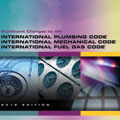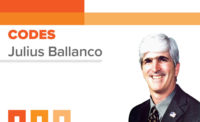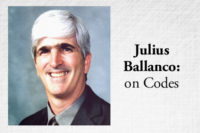
The ICC
Codes and Standards Council appoints members to the Plumbing Code Change
Committee, Mechanical Code Change Committee and Fuel Gas Code Change Committee.
Photo courtesy of ICC.
This past year, the International Codes Council reorganized its code change process. As a part of that reorganization, it created a single Codes and Standards Council.
The purpose of the council is to review and approve new codes and standards projects. The council also will recommend the appointment of individuals to serve on the various code-change committees. This is perhaps its biggest responsibility.
The ultimate appointment of code-change committee members is left to the ICC Board of Directors. However, it would be extremely rare to see the board not agree with the council’s recommendations.
ICC recently announced the appointment of the new Codes and Standards Council. The individuals appointed to the council are (professional designation and location in parentheses):John Terry(CBO, chair, New Jersey);Ken Kraus(vice chair, Los Angeles Fire Department);Scott Adams(Park City Fire Service District, Utah);Becky Baker(CBO, MCP, Jefferson County Division of Building Safety, Colorado);Bill Bryant(MCP, Anne Arundel County, Md.);Fulton Cochran(CBO, CFO, Henderson, Nev.);Jud Collins(CBO, RS, JULYCO, Mannford, Okla.);Rob Drexler(CPCA, Town of Greece, N.Y.);Ayla Erfigen(CBO, Transtech Engineers, Alhambra, Calif.);McKenzie James(Portland, Ore.);Gary Lewis(Summit, N.J.);Jim Olk(CBO, Farmers Branch, Texas);Marty Reiss(P.E., The RJA Group, Massachusetts);Tim Ryan(CBO, Overland Park, Kan.);Steve Shapiro(CBO, Hampton, Va.);Bill Stewart(FAIA, P.E., William W. Stewart Architect, Missouri); Jim Tidwell (Tidwell Code Consulting, Texas);Lynn Underwood(CBO, Norfolk, Va.);Greg Wheeler(CBO, Thornton, Colo.);Douglas Wise(CBO, CFM, MCP, West Palm Beach, Fla.); andRick Witt(CBO, Chesterfield, Va.).
These are all excellent individuals who will serve on the Codes and Standards Council. However, what is noticeably missing is a plumbing/mechanical engineer. The council has an architect, a fire protection engineer, a fire protection consultant, but no design professional with expertise in plumbing, mechanical or fuel gas design.
Clearly, the ICC Board of Directors missed the boat. There are three individuals on the council with a plumbing background. All three, again, are very good individuals and have experience as plumbing officials.
As expected, the council is loaded with building types and fire protection types, with 16 of the 21 members having this background. The problem is the fire and building types are going to appoint members to the Plumbing Code Change Committee, Mechanical Code Change Committee and Fuel Gas Code Change Committee. Yet, they have no background in this area. Hence, they will have to rely on the input of three current and former plumbing officials. Clearly, there needs to be more input from experts in the plumbing and mechanical profession.
Positive Hirings
A few years ago, ICC made a brilliant decision by hiringJay Petersas the executive director of the newly formed Plumbing, Mechanical and Fuel Gas group, also known as PMG. Peters brought instant credibility to ICC. Under Peters’ direction, ICC has done very well in advancing the plumbing, mechanical and fuel gas issues. The codes also have done very well.PMG had a separate council that recommended the appointment of code committee members. With the change to a single Codes and Standards Council, the ICC board has pulled the rug out from under the advances made by having a separate PMG council and a separate PMG group.
We are back to the appearance that the building and fire types control the plumbing, mechanical and fuel gas codes, not the plumbing and mechanical professionals. It is almost as if the ICC board has not learned anything regarding the plumbing and mechanical profession. We are still the stepchild.
ICC has stated we need to wait and see how the new system works before criticizing it. The wait is over and the first results are poor. The plumbing and mechanical profession has been ignored.
Did ICC board members forget they signed a memorandum of understanding with ASPE? You would think the MOU would stand for something. Apparently, it has no meaning when dealing with codes and standards.
During the last cycle, the plumbing, mechanical and fuel gas code-change committees’ performance was less than stellar when you consider the changes they could have approved and did not, as well as the changes they approved and should not have. It does not appear the committees will get any better in the near future.
I will give ICC credit for one thing. The ICC appointed one of the best individuals it could for the role as chairman of the Codes and Standards Council.John Terryis an exceptional selection. Terry demands the best in everything. He also gets the best. I am sure he will make the council thoroughly investigate the candidates for all the code change committees. My hope is Terry exerts his force in the plumbing, mechanical and fuel gas arena. I only wish the ICC gave Terry more help in this area on the council.
2012 Code Change Cycle
Within a few weeks, the Codes and Standards Council will appoint the code-change committees for the first cycle. Included in the first cycle are the plumbing, mechanical and fuel gas codes.Code changes to the 2012 Plumbing, Mechanical or Fuel Gas Code are due by Jan. 3, 2012. This is the last opportunity to submit a change to the 2015 codes. By November 2012, we will know what the content of the 2015 Plumbing, Mechanical and Fuel Gas Code will be. If you miss this deadline, you must wait until the 2018 cycle to submit a change.
If you are wondering, yes, it has gotten very screwy by having one code change cycle that takes less than one year, to develop a code every three years. Did you follow that? The result will be the code is out of date on certain issues before it is published.
The 2012 ICC International Codes are available. You can purchase them atwww.iccsafe.org.
While ICC thinks it has made great and wonderful changes to its code change process, the first results are clearly a snub to plumbing and mechanical engineers. It needs to improve and improve quickly. There is no sense waiting when it has ignored our profession.



